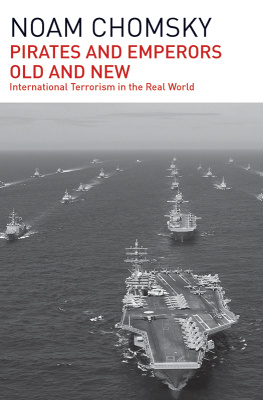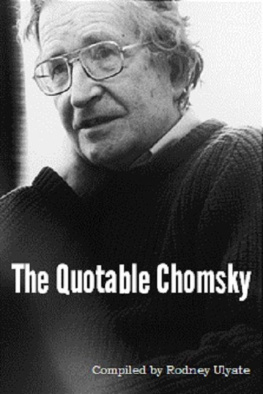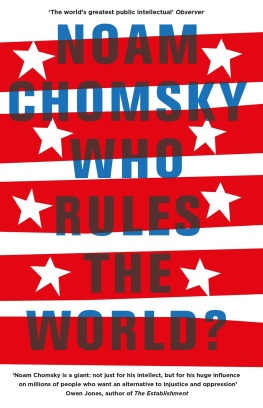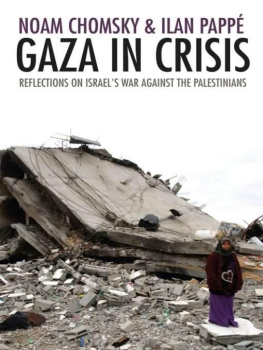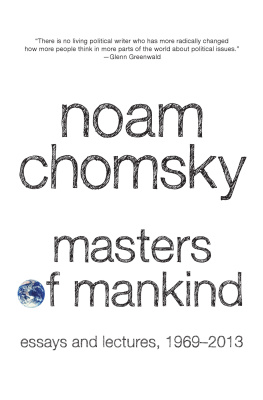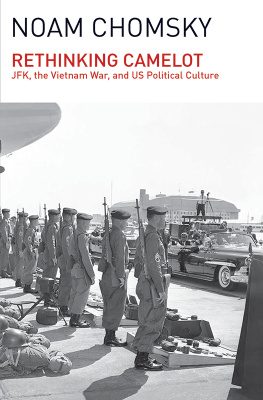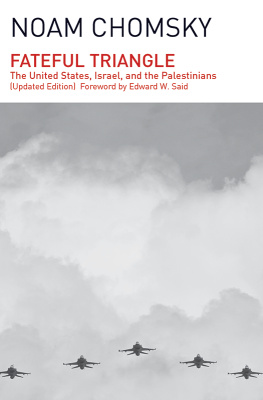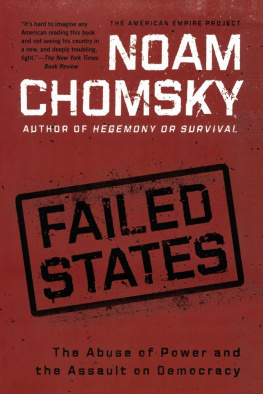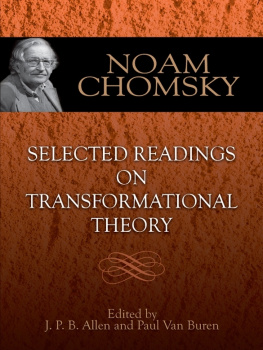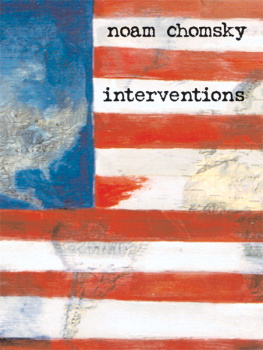Contents
Contents
Preface to the 2015 Edition vii
Preface to the First Edition xiii
Introduction 1
1. Thought Control: The Case of the Middle East 25
2. Middle East Terrorism and the American Ideological System 49
3. Libya in U.S. Demonology 105
4. The U.S. Role in the Middle East 135
5. International Terrorism: Image and Reality 155
6. The World after September 11 187
7. U.S./IsraelPalestine 207
Notes 235
Index 275
Noam Chomsky 2002
Original edition published by South End Press in Cambridge, Massachusetts
This edition published in 2015 by
Haymarket Books
P.O. Box 180165
Chicago, IL 60618
773-583-7884
www.haymarketbooks.org
info@haymarketbooks.org
ISBN: 978-1-60846-442-5
Trade distribution:
In the US, Consortium Book Sales and Distribution, www.cbsd.com
All other countries, Publishers Group Worldwide, www.pgw.com
This book was published with the generous support of Lannan Foundation and Wallace Action Fund.
Cover design by Josh On. Cover photo of the aircraft carrier USS Ronald Reagan on the Pacific Ocean. Photo by U.S. Navy Mass Communication Specialist 3rd Class Dylan McCord.
Library of Congress Cataloging-in-Publication data is available.
Preface to the First Edition (1986)
St. Augustine tells the story of a pirate captured by Alexander the Great, who asked him how he dares molest the sea. How dare you molest the whole world? the pirate replied: Because I do it with a little ship only, I am called a thief; you, doing it with a great navy, are called an Emperor.
The pirates answer was elegant and excellent, St. Augustine relates. It captures with some accuracy the current relations between the United States and various minor actors on the stage of international terrorism: Libya, factions of the PLO, and others. More generally, St. Augustines tale illuminates the meaning of the concept of international terrorism in contemporary Western usage, and reaches to the heart of the frenzy over selected incidents of terrorism currently being orchestrated, with supreme cynicism, as a cover for Western violence.
The term terrorism came into use at the end of the eighteenth century, primarily to refer to violent acts of governments designed to ensure popular submission. That concept plainly is of little benefit to the practitioners of state terrorism, who, holding power, are in a position to control the system of thought and expression. The original sense has therefore been abandoned, and the term terrorism has come to be applied mainly to retail terrorism by individuals or groups. Whereas the term was once applied to emperors who molest their own subjects and the world, now it is restricted to thieves who molest the powerfulthough not entirely restricted: the term still applies to enemy emperors, a category that shifts with the needs of power and ideology.
Extricating ourselves from such practices, we use the term terrorism to refer to the threat or use of violence to intimidate or coerce (generally for political, religious, or other such ends), whether it is the terrorism of the emperor or of the thief.
The pirates maxim explains the recently evolved concept of international terrorism only in part. It is necessary to add a second feature: an act of terrorism enters the canon only if it is committed by their side, not ours. That was the guiding doctrine of the public relations campaign about international terrorism launched by the Reagan Administration as it came to office. It relied on scholarship claiming to have established that the plague is a Soviet-inspired instrument, aimed at the destabilization of Western democratic society, as shown by the alleged fact that terrorism is not directed against the Soviet Union or any of its satellites or client states, but rather occurs almost exclusively in democratic or relatively democratic countries.
The thesis is true, in fact true by definition, given the way the term terrorism is employed by the emperor and his loyal coterie. Since only acts committed by their side count as terrorism, it follows that the thesis is necessarily correct, whatever the facts. In the real world, the story is quite different. The major victims of international terrorism
Similarly, it is not terrorism when paramilitary forces operating from U.S. bases and trained by the CIA bombard Cuban hotels, sink fishing boats and attack Russian ships in Cuban harbors, poison crops and livestock, attempt to assassinate Castro, and so on, in missions that were running almost weekly at their peak. These and many similar actions on the part of the emperor and his clients are not the subject of conferences and learned tomes, or of anguished commentary and diatribes in the media and journals of opinion.
Standards for the emperor and his court are unique in two closely related respects. First, their terrorist acts are excluded from the canon; second, while terrorist attacks against them are regarded with extreme seriousness, even requiring violence in self-defense against future attack as we will see, comparable or more serious terrorist attacks against others do not merit retaliation or preemptive action, and if undertaken would elicit fury and a fearsome response. The significance of such terrorist attacks is so slight that they need barely be reported, surely not remembered. Suppose, for example, that a seaborne Libyan force were to attack three American ships in the Israeli port of Haifa, sinking one of them and damaging the others, using East German-made missiles. There is no need to speculate on the reaction. Turning to the real world, on June 5, 1986, a seaborne South African force attacked three Russian ships in the southern Angolan harbour of Namibe, sinking one of them, using Israeli-made Scorpion [Gabriel] missiles.
If the Soviet Union had responded to this terrorist attack against commercial shipping as the U.S. would have done under similar circumstancesperhaps by a firebombing that would have destroyed Johannesburg, to judge by the action-response scale of U.S. and Israeli retaliationthe U.S. might well have considered a nuclear strike as legitimate retaliation against the Communist devil. In the real world, the USSR did not respond, and the events were considered so insignificant that they were barely mentioned in the U.S. press.
Suppose that Cuba were to have invaded Venezuela in late 1976 in self-defense against terrorist attack, with the intent of establishing a New Order there organized by elements under its control, killing 200 Americans manning an air defense system, heavily shelling the U.S. Embassy and finally occupying it for several days during its conquest of Caracas in violation of a cease-fire agreement. Turning again to the real world, in 1982 Israel attacked Lebanon under the pretext of protecting the Galilee against terrorist attack (fabricated for the U.S. audience, as tacitly conceded internally), with the intent of establishing a New Order there organized by elements under its control, killing 200 Russians who were manning an air defense system, heavily shelling the Russian Embassy and finally occupying it for two days during its conquest of West Beirut in violation of a cease-fire agreement. The facts were casually reported in the U.S., with the context and crucial background ignored or denied. There was, fortunately, no Soviet response, or we would not be here today to discuss the matter.
In the real world, we assume as a matter of course that the Soviet Union and other official enemies, most of them defenseless, will calmly endure provocations and violence that would elicit a furious reaction, verbal and military, if the emperor and his court were the victims.
The stunning hypocrisy illustrated by these and innumerable other cases, some discussed below, is not restricted to the matter of international terrorism. To mention a different case, consider the World War II agreements that allocated control over parts of Europe and Asia to the several Allied powers and called for withdrawal at specified times. There was great outrage over (in fact, outrageous) Soviet actions in Eastern Europe modeled closely on what the U.S. had done in the areas assigned to Western control under wartime agreements (Italy, Greece, South Korea, etc.); and over the belated Soviet withdrawal from northern Iran, while the U.S. violated its wartime agreements to withdraw from Portugal, Iceland, Greenland, and elsewhere, on the grounds that military considerations make such withdrawal inadvisable, the Joint Chiefs of Staff argued with State Department concurrence. There wasand to this day isno outrage over the fact that West German espionage operations, directed against the USSR, were placed under the control of Reinhard Gehlen, who had conducted similar operations for the Nazis in Eastern Europe, or that the CIA was sending agents and supplies to aid armies encouraged by Hitler fighting in Eastern Europe and the Ukraine as late as the early 1950s as part of the roll-back strategy made official in NSC-68 (April 1950).
Next page
